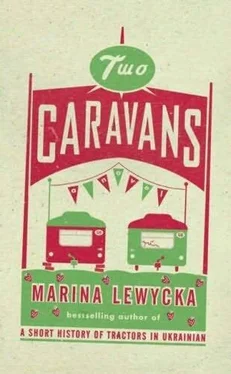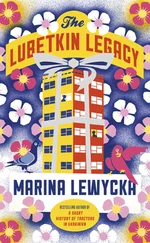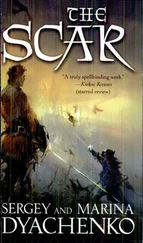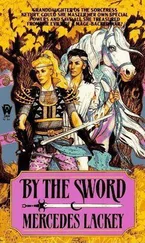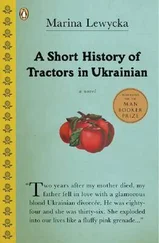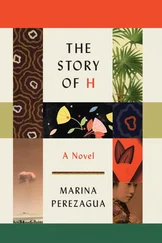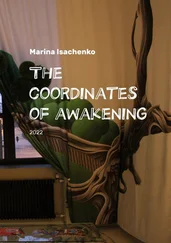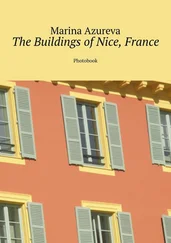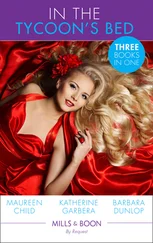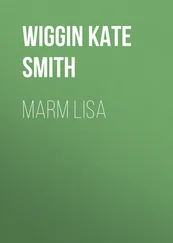
Marina Lewycka
Two Caravans
© 2007
Aka Strawberry Fields
There is a field-a broad south-sloping field sitting astride a long hill that curves away into a secret leafy valley. It is sheltered by dense hedges of hawthorn and hazel threaded through with wild roses and evening-scented honeysuckle. In the mornings, a light breeze carries up over the Downs, just enough to kiss the air with the fresh salty tang of the English Channel. In fact so delightful is the air that, sitting up here, you might think you were in paradise. And in the field are two caravans, a men’s caravan and a women’s caravan.
If this was really the Garden of Eden, though, there ought to be an apple tree, thinks Yola. But it is the Garden of England, and the field is full of ripening strawberries. And instead of a snake, they have the Dumpling.
Sitting on the step of the women’s caravan, painting her toenails fuchsia pink, petite voluptuous Yola watches the Dumpling’s Land Rover pull in through the gate at the bottom of the field, and the new arrival clamber down out of the passenger seat. Really, she cannot for the life of her understand why they have sent this two-zloty-pudding of a girl, when what is clearly needed is another man-preferably someone mature, but with his own hair and nice legs, and a calm nature-who will not only pick faster, but will bring a pleasant sexual harmony to their small community, whereas anyone can see that this little miss is going to set the fox among the chickens, and that all the men will be vying for her favours and not paying attention to what they are really here for, namely the picking of strawberries. This thought is so annoying that it makes Yola lose concentration on her middle toe, which ends up looking like a botched amputation.
And there is also the question of space, Yola broods, studying the new girl as she makes her way past the men’s caravan and up the field. Although there are more women than men, the women’s caravan is the smaller, just a little four-berth tourer that you might tow behind when you go off on holiday to the Baltic. Yola, as the supervisor, is a person of status, and although petite she is generously proportioned, so naturally she has a single bunk to herself. Marta, her niece, has the other single bunk. The two Chinese girls-Yola can never get the hang of their names-share the fold-out double bed, which, when extended, takes up the whole floor space. That’s it. There is no room for anyone else.
The four of them have done their best to make their caravan seem bright and homely. The Chinese girls have stuck pictures of baby animals and David Beckham on the walls. Marta has stuck a picture of the Black Virgin of Krakow beside David Beckham. Yola, who likes things to smell nice, has set a bunch of wild flowers in a cup, hedge roses, campion and white-gold honeysuckle, to sweeten the air.
A particularly charming feature of their caravan is the clever storage space: there are compact cupboards, cunning head-level lockers and drawers with delightful decorative handles where everything can be hidden away. Yola likes things to be neat. The four women have become skilled at avoiding each other, skirting round each other in the small space with womanly delicacy, unlike men, who are defective creatures, prone to be clumsy and take up unnecessary room, though of course they can’t help it and they do have some good points, which she will tell you about later.
This new girl-she skips straight up to the caravan and drops her bag down right in the middle of the floor. She has come from Kiev, she says, looking around her with a smile on her face. Irina is her name. She looks tired and dishevelled, with a faint whiff of chip fat about her. Where does she think she is going to keep that bag?
Where does she think she is going to sleep? What does she have to smile about? That’s what Yola wants to know.
“Irina, my baby, you can still change your mind! You don’t have to go!”
Mother was wailing and dabbing at her pinky eyes with a tissue, causing an embarrassing scene at Kiev bus station.
“Mother, please! I’m not a baby!”
You expect your mother to cry at a moment like this. But when my craggy old Pappa turned up too, his shirt all crumpled and his silver hair sticking up like an old-age porcupine, OK, I admit it rattled me. I hadn’t expected him to come to see me off.
“Irina, little one, take care.”
“ Shcho ti , Pappa. What’s all this about? Do you think I’m not coming back?”
“Just take care, my little one.” Sniffle. Sigh.
“I’m not little, Pappa. I’m nineteen. Do you think I can’t look after myself?”
“Ah, my little pigeon.” Sigh. Sniffle. Then Mother started up again. Then-I couldn’t help myself-I started up too, sighing and sniffling and dabbing my eyes, until the coach driver told us to get a move on, and Mother shoved a bag of bread and salami and a poppy-seed cake into my hands, and we were off. From Kiev to Kent in forty-two hours.
OK, I admit, forty-two hours on a coach is not amusing. By the time we reached Lviv, the bread and salami were all gone. In Poland, I noticed that my ankles were starting to swell. When we stopped for fuel somewhere in Germany I stuffed the last crumbs of the poppy-seed cake into my mouth and washed it down with nasty metallic-tasting water from a tap that was marked not for drinking. In Belgium my period started, but I didn’t notice until the dark stain of blood seeped through my jeans into the seat. In France I lost all sensation in my feet. On the ferry to Dover I found a toilet and cleaned myself up. Looking into the cloudy mirror above the washbasin I hardly recognised the wan dark-eyed face that stared back at me-was that me, that scruffy straggle-haired girl with bags under her eyes? I walked about to restore the circulation in my legs, and standing on the deck at dawn I watched the white cliffs of England materialise in the pale watery light, beautiful, mysterious, the land of my dreams.
At Dover I was met off the boat by Vulk, waving a bit of card with my name on it-Irina Blazkho. Typical-he’d got the spelling wrong. He was the type Mother would describe as a person of minimum culture, wearing a horrible black fake-leather jacket, like a comic-strip gangster-what a koshmarl -it creaked as he walked. All he needed was a gun.
He greeted me with a grunt. “Hrr. You heff passport? Peppers?”
His voice was deep and sludgy, with a nasty whiff of cigarette smoke and tooth decay.
This gangster-type should brush his teeth. I fumbled in my bag, and before I could say anything he grabbed my passport and Seasonal Agricultural Worker papers and stowed them in the breast pocket of his koshmar jacket.
“I keep for you. Is many bed people in England. Can stealing from you.”
He patted the pocket, and winked. I could see straightaway that there was no point in arguing with a person of this type, so I hoisted my bag onto my shoulder and followed him across the car park to a huge shiny black vehicle that looked like a cross between a tank and a Zill, with darkened windows and gleaming chrome bars at the front-a typical mafia-machine. These high-status cars are popular with primitive types and social undesirables. In fact he looked quite like his car: overweight, built like a tank, with a gleaming silver front tooth, a shiny black jacket, and a straggle of hair tied in a ponytail hanging down his back like an exhaust pipe. Ha ha.
He gripped my elbow, which was quite unnecessary-stupid man, did he think I might try to escape?-and pushed me onto the back seat with a shove, which was also unnecessary. Inside, the mafia-machine stank even more of tobacco. I sat in silence looking nonchalantly out of the window while he scrutinised me rudely through the rear-view mirror. What did he think he was staring at? Then he lit up one of those thick vile-smelling cigars-mother calls them New Russian cigarettes-what a stink!-and started puffing away. Puff. Stink.
Читать дальше
